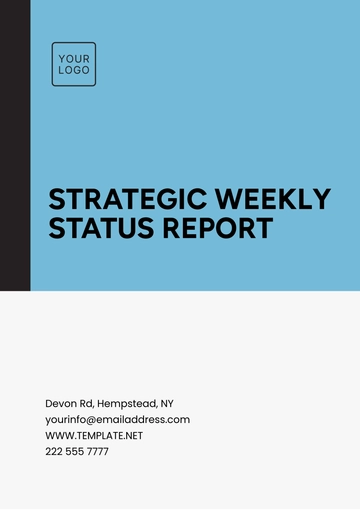Free Weekly Training Report

Prepared by: [YOUR NAME]
Department: [YOUR DEPARTMENT]
Company: [YOUR COMPANY NAME]
Date: [REPORT DATE]
I. Introduction
The [YOUR COMPANY NAME] Weekly Training Report is designed to track your progress and development in various training activities throughout the week. Training plays a pivotal role in enhancing your skills, knowledge, and capabilities, ultimately contributing to your professional growth and the success of [YOUR DEPARTMENT]. This report enables you to reflect on your training experiences, identify areas of improvement, and set goals for continuous learning and development.
Training initiatives are an integral part of our organization's commitment to employee empowerment and skill enhancement. By actively participating in training sessions and workshops, you not only expand your expertise but also contribute to a culture of learning and innovation within the company. This report serves as a platform for documenting your training journey and ensuring alignment with your career objectives and organizational goals.
II. Training Activities
A. Completed Training Sessions
[Number] of training sessions attended during the week, including:
[Training Session 1]: Brief description of the session content and key takeaways.
[Training Session 2]: Overview of the topics covered and relevance to your role or responsibilities.
Active participation in interactive learning activities, such as group discussions, case studies, and practical exercises.
B. Ongoing Training Programs
Progress updates on ongoing training programs or courses:
[Training Program 1]: Summary of modules completed and progress towards certification or proficiency.
[Training Program 2]: Challenges encountered and strategies for overcoming obstacles in the learning process.
Engagement with online resources and learning platforms to supplement formal training initiatives.
III. Findings
A. Productivity Analysis
[YOUR NAME] demonstrated consistent engagement and participation in training activities throughout the week.
Analysis of self-assessment results indicates strengths in [Area of Strength] and opportunities for improvement in [Area for Improvement].
B. Training Effectiveness
Feedback from [Trainers/Mentors] highlights positive responses to training content and delivery.
Evaluation of knowledge application reveals areas where additional support or reinforcement may be beneficial.
IV. Training Evaluation
A. Skills Assessment
Self-assessment of acquired skills and competencies following training sessions.
Identification of areas of strength and areas requiring further development or reinforcement.
Feedback received from trainers or mentors on your performance and progress during training activities.
B. Knowledge Application
Application of newly acquired knowledge and skills to real-world scenarios or work projects.
Examples of how training insights have been integrated into your daily tasks or responsibilities.
Impact of training on your ability to meet job requirements and achieve performance objectives.
V. Recommendations
A. Skill Development
Allocate dedicated time for self-directed learning and skill development in areas identified for improvement.
Explore opportunities for mentorship or peer support to enhance learning and application of training insights.
B. Training Enhancement
Provide additional resources or supplementary materials to reinforce key concepts covered in training sessions.
Incorporate interactive learning activities or simulations to enhance engagement and retention of training content.
VI. Training Goals and Objectives
A. Short-Term Goals
[Short-Term Goal 1]: Description of a specific skill or competency you aim to improve in the short term.
[Short-Term Goal 2]: Objective related to applying training insights to enhance job performance or efficiency.
[Short-Term Goal 3]: Target for completing ongoing training programs or certifications.
B. Long-Term Objectives
Long-term career development objectives aligned with your professional aspirations and organizational needs.
Strategies for continuous learning and skill enhancement to progress towards your career goals.
Alignment of training goals with performance appraisal and career advancement opportunities within the company.
VII. Conclusion
In conclusion, training is a cornerstone of professional development and growth within [YOUR COMPANY NAME]. Your active participation in training activities demonstrates your commitment to personal and professional improvement. By leveraging the insights gained from training sessions and applying them to your role, you contribute to the overall success of the organization. Moving forward, continue to prioritize learning and development opportunities to unlock your full potential and drive excellence in your work.
- 100% Customizable, free editor
- Access 1 Million+ Templates, photo’s & graphics
- Download or share as a template
- Click and replace photos, graphics, text, backgrounds
- Resize, crop, AI write & more
- Access advanced editor
Introducing the Weekly Training Report Template from Template.net! This versatile tool is fully editable and customizable to suit your unique needs. Crafted with precision, it's the perfect solution for tracking progress and performance. Seamlessly editable in our AI Editor Tool, it offers unparalleled convenience and efficiency. Boost productivity effortlessly!
You may also like
- Sales Report
- Daily Report
- Project Report
- Business Report
- Weekly Report
- Incident Report
- Annual Report
- Report Layout
- Report Design
- Progress Report
- Marketing Report
- Company Report
- Monthly Report
- Audit Report
- Status Report
- School Report
- Reports Hr
- Management Report
- Project Status Report
- Handover Report
- Health And Safety Report
- Restaurant Report
- Construction Report
- Research Report
- Evaluation Report
- Investigation Report
- Employee Report
- Advertising Report
- Weekly Status Report
- Project Management Report
- Finance Report
- Service Report
- Technical Report
- Meeting Report
- Quarterly Report
- Inspection Report
- Medical Report
- Test Report
- Summary Report
- Inventory Report
- Valuation Report
- Operations Report
- Payroll Report
- Training Report
- Job Report
- Case Report
- Performance Report
- Board Report
- Internal Audit Report
- Student Report
- Monthly Management Report
- Small Business Report
- Accident Report
- Call Center Report
- Activity Report
- IT and Software Report
- Internship Report
- Visit Report
- Product Report
- Book Report
- Property Report
- Recruitment Report
- University Report
- Event Report
- SEO Report
- Conference Report
- Narrative Report
- Nursing Home Report
- Preschool Report
- Call Report
- Customer Report
- Employee Incident Report
- Accomplishment Report
- Social Media Report
- Work From Home Report
- Security Report
- Damage Report
- Quality Report
- Internal Report
- Nurse Report
- Real Estate Report
- Hotel Report
- Equipment Report
- Credit Report
- Field Report
- Non Profit Report
- Maintenance Report
- News Report
- Survey Report
- Executive Report
- Law Firm Report
- Advertising Agency Report
- Interior Design Report
- Travel Agency Report
- Stock Report
- Salon Report
- Bug Report
- Workplace Report
- Action Report
- Investor Report
- Cleaning Services Report
- Consulting Report
- Freelancer Report
- Site Visit Report
- Trip Report
- Classroom Observation Report
- Vehicle Report
- Final Report
- Software Report





























